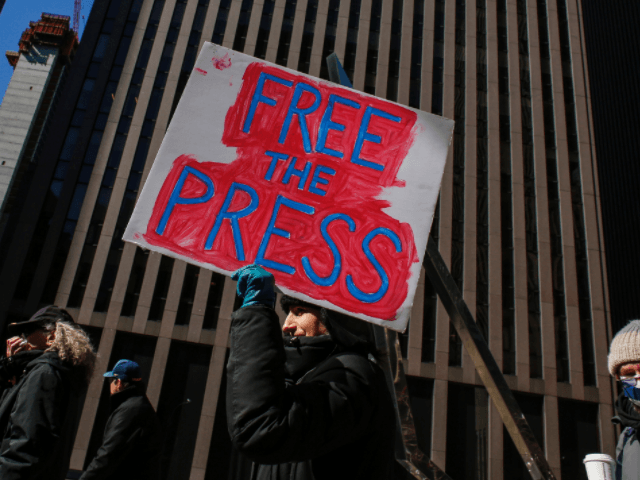Politico’s senior media writer said journalists’ old tweets are “fair game” in response to the ongoing media frenzy spurred by Breitbart News exposing threads of antisemitism embedded in the New York Times newsroom.
Jack Shafer defended the practice of unearthing controversial statements made by prominent members of the media and holding them accountable in an exposé featured in Politico Magazine Monday. Breitbart News’s extensive reporting on antisemitic and racist statements made by Tom Wright-Piersanti, a senior editor at the New York Times, sparked the national conversation.
Shafer suggested those in the field are not entitled to a “get-out-of-bigotry-jail free card just because they’re journalists”:
As much as I would like to sympathize with my fellow journalists, it doesn’t strike me as unreasonable to ask them to own or repudiate vile or impolitic things they might have stated in the past. Nor is it remotely unfair for the president’s supporters to demand that journalists, who are forever denouncing him as a racist (because he is), be held accountable for their bigoted speech, on Twitter or anywhere else. Journalists don’t deserve a get-out-of-bigotry-jail free card just because they’re journalists. If their past tweets, however ancient, undercut their current journalistic work or make them sound hypocritical, they can’t blame their diminished prestige on Trump’s allies. It’s like blaming a cop for writing you a ticket for speeding in a school zone.
The Times‘ publisher A.G. Sulzberger was demonstratively irked by Breitbart News’s reporting and released a statement, promising that the outlet would not be “intimidated or silenced” by allies of President Donald Trump.
“They are seeking to harass and embarrass anyone affiliated with the leading news organizations that are asking tough questions and bringing uncomfortable truths to light,” Sulzberger claimed.
“The goal of this campaign is clearly to intimidate journalists from doing their job, which includes serving as a check on power and exposing wrongdoing when it occurs. The Times will not be intimidated or silenced,” Sulzberger added.
For years the president has used terms like ‘fake news’ and ‘enemy of the people’ to demonize journalists and journalism. Now, the political operatives behind this campaign will argue that they are ‘reporting’ on news organizations in the same way that news organizations report on elected officials and other public figures. They are not. They are using insinuation and exaggeration to manipulate the facts for political gain. I want to thank the journalists at The Times and elsewhere who brave this type of pressure daily to bring essential information to the public. Under intense scrutiny and routine harassment, they remain undeterred. When our reporters learned of this campaign to attack journalists, they did what our colleagues around the globe always do. They went to work and started reporting.
However, Shafer suggests Sulzberger’s statement was the epitome of hypocrisy.
“Sulzberger tempered his protest toward the end of his memo by writing, ‘But I also want to be clear: No organization is above scrutiny, including the Times.’ But that’s an example of wanting to have it both ways,” he wrote.
“If the press is not above scrutiny, it shouldn’t bellyache when truth-squaded—even if the best dirt the truth-squaders can surface is encrusted in dust and mold,” he continued, adding that the “embarrassments unearthed by Schwartz and company” will help news outlets like the Times, Washington Post, and CNN secure the journalistic standards they claim to already possess.
“But in the long run, these minirevelations will help them maintain the professional standards they’re always crowing about,” he continued. “Instead of damning its critics for going through its staffs’ social media history with tweezers, the Times and A.G. Sulzberger should send them a thank you card.”
"Journalists don’t deserve a get-out-of-bigotry-jail free card just because they’re journalists." https://t.co/eD42LPgS5r
— Elaina Plott (@elainaplott) August 26, 2019
Shafer weighs in; NYT gets more blowback on A1 story about efforts to discredit journalists. https://t.co/thJgDjKEjp
— David Folkenflik (@davidfolkenflik) August 26, 2019
“Journalists don’t deserve a get-out-of-bigotry-jail free card just because they’re journalists.” – @jackshafer https://t.co/GZvOukBDC2
— Tim O'Brien (@TimOBrien) August 26, 2019
As a reporter who regrettably fits this description of not being “thin-skinned,” but having no skin, I also basically agree with @jackshafer. Right-wing operatives digging up bad things we said 10 years ago are not a threat to democracy or the free press. https://t.co/fSk3fmVurJ
— Jonathan Swan (@jonathanvswan) August 26, 2019
The Times admitted in a piece published over the weekend, authored by Jeremy Peters and Ken Vogel, that Wright-Piersanti’s remarks were, in fact, problematic.
As Breitbart News reported:
A piece the New York Times released on Sunday, which described a broader operation of loosely organized supporters of President Donald Trump fighting back against the media with aggressive new tactics, was the first time the newspaper in its own pages addressed the scandal regarding Wright-Piersanti. In the piece, the Times reveals that it considers the tweets racist and antisemitic. Before this piece, the Times had only described the content as a “violation” of its standards–and Wright-Piersanti had only described the content as “offensive.” Now, for the first time on Sunday–three days after Breitbart News broke the story on Thursday–the Times admitted they were both racist and antisemitic.
Sulzberger continued to frame the entire controversy as an “attack” and promised to “continue to cover this administration like any other: fairly, aggressively and fearlessly, wherever the facts lead.” It would seem, though, that not all journalists are on board with the Times’ view on the bubbling controversy.

COMMENTS
Please let us know if you're having issues with commenting.